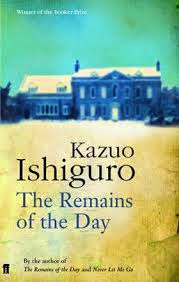
Now here is a book that I thought would break an immutable rule, and be that book that is worse than the movie.
That was my impression for about the first 90%. But then Ishiguro comes for you with a knife, and you realise the whole thing is perfectly constructed, absolutely killer, and has got not much to do with the film at all. Based on the movie, I thought it was going to be a romance; but it’s not. It’s about the absence of romance; about missed chances and love not lost but never found. It reminds me of THE AGE OF INNOCENCE, a novel I blubbed through while listening on audio book as I drove across rural South Africa. But that’s another story.
REMAINS OF THE DAY occurs over the course of a few days’ motoring holiday taken by a butler in the 1950s. During the course of the trip he reflects on his life, and tells the story of his many years of service at one of England’s ‘great homes.’ Much of the story involves his former employer, Lord Darlington, who tried to make peace with the Germans before the war, and came to be seen by many as a Nazi sympathiser. Almost at the periphery of the story is the housekeeper, a Miss Kenton, who he spends much time with – in a professional capacity, as he continually reminds us – and who eventually leaves the house to get married. He goes to visit her on this motoring trip, having not seen her in twenty years, and realises at last what he missed out on.
He sits on a pier, at the end, talking to a stranger as the street lights come on The butler begins to talk about Lord Darlington: “He wasn’t a bad man at all. And at least he had the privilege of being able to say at the end of his life that he made his own mistakes. His lordship was a courageous man. He chose a certain path in life, it proved to be a misguided one, but there, he chose it, he can say that at least. As for myself, I cannot even claim that. You see, I trusted. . . I trusted I was doing something worth while. I can’t even say I made my own mistakes.” The stranger tells him he shouldn’t look back, and get depressed, and that the evening is the best part of the day, and should be enjoyed, especially as an older man, who has not much time left. Left alone, the butler thinks to himself:
Perhaps, then, there is something to his advice that I should cease looking back so much, that I should adopt a more positive outlook and try to make the best of what remains of my day. After all, what can we ever gain in forever looking back and blaming ourselves if our lives have not turned out quite as we might have wished? The hard reality is, surely, that for the likes of you and me, there is little choice other than to leave our fate, ultimately, in the hands of those great gentlemen at the hub of this world who employ our services. What is the point in worrying oneself too much about what one could or could not have done to control the course one’s life took? Surely it is enough that the likes of you and me at least try to make a small contribution count for something true and worthy. And if some of us are prepared to sacrifice much in life in order to pursue such aspirations, surely that is in itself, whatever the outcome, cause for pride and contentment.
I sure as hell hope I am making my own mistakes.
